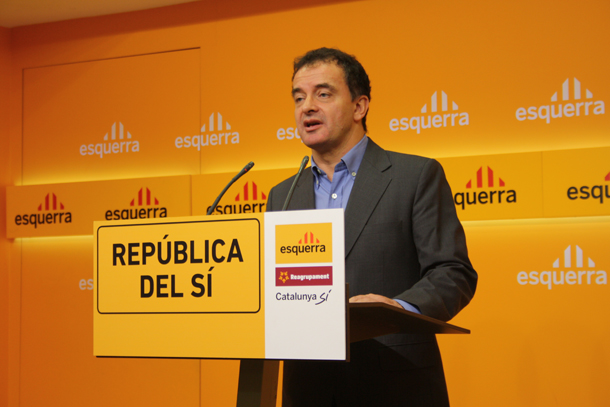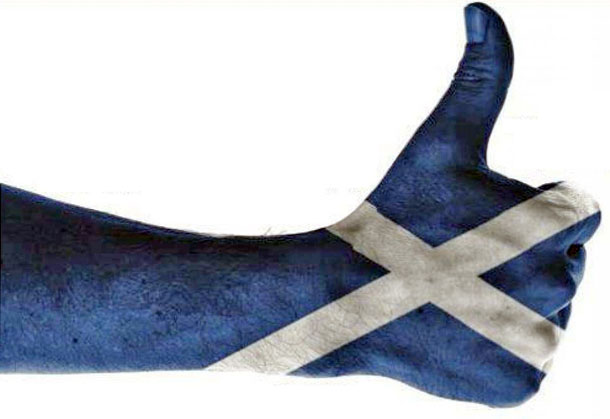2 December 2012 Edition
A referendum for Catalonia and Caledonia
An Phoblacht meets Republican Left MP Alfred Bosch in Barcelona

• Alfred Bosch is a Member of Parliament for Catalonia and a major voice in the Catalan independence movement
Just over a month before we sit down under the magnificent mirrors of the Cafè De L’Òpera, 1.5million people packed the streets of Barcelona on Catalan National Day (11 September) to demand ‘Freedom for Catalonia’ (organisers said an equivalent march in Washington DC would have to number 83million).
ALFRED BOSCH is a Member of Parliament for Catalonia and a major voice in the Catalan independence movement. Alfred was the main spokesperson in Barcelona for the grassroots people’s referendum on independence from Spain and he spoke at this year’s Sinn Féin Summer School in west Cork.
A novelist and author, his books in Catalan are among best-sellers and have been translated into several languages. He has won the top literary awards in Catalonia.
An academic specialising in History of Africa and Europe, he has lectured in universities in Barcelona, Madrid, London, Ibadan, Witwatersrand (South Africa), Chicago and others.
An Phoblacht Editor JOHN HEDGES caught up with Alfred again in Barcelona prior to November’s regional elections, when Alfred was again standing for the Republican Left of Catalonia.
CATALONIA is in political ferment, although you might not think so taking a stroll down Barcelona’s famous La Rambla from Plaća de Catalunya amongst the throngs of tourists even in the autumn.
Barcelona was a cockpit of revolution during the Spanish Civil War, pitting not just republicans against fascists but communists against anarchists.
On La Rambla, the Hotel Rivoli was formerly the headquarters of the Marxist POUM party that George Orwell joined. Off La Rambla, close to Plaça de Catalunya, is the Bar Llibertària, a CNT co-op where photographs and posters of Barcelona’s anarchists in the Spanish Civil War cover the walls.
Alfred Bosch suggests we meet in the Cafè De L’Òpera, across from the Opera House on La Rambla. Opened in 1929, it has never stopped operating, not even during the Spanish Civil War.
Just over a month before we sit down under the magnificent mirrors of the Cafè De L’Òpera, 1.5million people packed the streets of Barcelona on Catalan National Day (11 September) to demand ‘Freedom for Catalonia’ (organisers said an equivalent march in Washington DC would have to number 83million).
Hundreds of thousands of people arrived in the capital from right across the region on more than a thousand chartered coaches and trains.
Speakers and prominent supporters included music, TV, movie and football stars as well as political figures, trade unionists and all other walks of life.
11 September marks the anniversary of the 1714 defeat of Catalan troops by Phillip V of Spain following a 14-month siege of Barcelona when 14,000 of the city’s defenders were slaughtered. The defeat marked the beginning of a centralised Spanish state and the suppression of Catalan identity.
As they marched towards the Fossar de les Moreres, where the Catalan troops from 1714 are buried, the crowds chanted: “What do we want? A new European state! What do the people want? An independent Catalonia!”
The Spanish Government did not hide its anger that the Centre-Right President of Catalonia, Artur Mas, used his eve of Catalan National Day speech to call for more “justice and liberty” from Spain. Speaking on television, President Mas said:
“Tomorrow, many compatriots will demonstrate in Barcelona. My heart will be with you because, ultimately — whether you are demanding a fiscal pact or our own state — all your voices will be raised in the same direction: for more justice and more freedom for Catalonia.”
The open increase in support for Catalan independence saw the spectre of Spain’s fascist past under General Franco appear when the Spanish armed forces retired officers’ association (AME) issued a statement saying that anyone promoting “Spain’s fracture” (i.e. independence for Catalonia) could be court-martialled. AME named the President of Catalonia and all the members of his party as potential defendants in military tribunals.
Tension increased after no less a figure than European Parliament Vice-President Alejo Vidal Quadras called on Spanish TV for the Spanish Government to send in the paramilitary police and “take over” the autonomous region of Catalonia to stop it gaining independence. Quadras, an MEP for the ruling conservative Spanish People’s Party, said it was time to “stop by any means necessary” independence for the economically powerful region.
His call came after Catalonia’s parliament voted at the end of September by 84 to 21 in favour of a resolution to hold a referendum on independence within four years. Spanish Army Colonel Francisco Alamán had previously said in an interview with Alerta Digital that Catalonia would only be independent “over my dead body and that of many other soldiers”. He declared that the Spanish Army has solemnly sworn to defend “the non-negotiable principle of Spain’s unity” and that they will defend it “even with our lives”.
Tide of history
Alfred Bosch speaks with the enthusiasm of a campaigning politician who is part of the tide of history. Alfred and many Catalans want a referendum from Spain similar to the one Westminster has accepted for 2014 on Scottish independence.
“That’s what we’re asking for, the same that Scotland is getting.
“We’ve never had so many people on the streets asking clearly and so explicitly for independence,” Alfred tells An Phoblacht, recalling the crowd of 1.5million that surged through the city the previous month.
Barcelona has a population of 1.6million. When you take into account the number of people who are housebound (such as the elderly and the sick) and children — leaving aside the anti-independence unionists — that is a phenomenal number of people, the Republican Left MP points out.
“There is a majority for independence and the push is coming from the people themselves. The Catalan Government has responded to this in a positive way and said that if there is a clear majority of parties after the election calling for a referendum on independence then they will hold one and, if passed, will then advance towards independence.”
The main obstacle is not public opinion, the Catalan MP says, but “Spanish power” — the Spanish Government, institutions, the judiciary, the military and the crown.
Despite the veiled and open threats by political and military figures from Madrid, Alfred Bosch emphasises that dialogue with the Spanish state is what Catalans are striving for, not conflict.
“What we want to obtain through dialogue is what the Scottish nation has obtained from Westminster, which is the permission or granting or delegation to call a referendum on independence and self-determination.
“We are not fooling ourselves,” he says. He knows this is very hard for many in Madrid to accept “because of the tradition of Spanish power, which is not of full democracy,” a diplomatic allusion to Spain’s fascist past under the rule of Franco from 1936 to 1975.
“Our ideal path is a democratic, peaceful, friendly divorce. That’s our aim and we will exhaust all paths to try and go that way.”
And if that’s not possible? That’s where ‘Plan B’ comes in, he says.
“What the Catalan Government says is that if a way cannot be found through the Spanish political system it should be found through Catalan legislation — be it existing or new legislation — and searching for the protection of European law and the European political system.”

There are similarities between Scotland and Catalonia even though they are obviously not the same, Alfred Bosch accepts. “Scotland and Catalonia are the same in broad political terms,” he says. They have different histories and Catalans don’t wear kilts “and we don’t blow bagpipes”, he laughs, adding: “But the situation is identical — a people wants to vote for its future.”
Unionists
The majority in the Catalan Parliament (85%) has agreed that it will hold a referendum “preferably” within its next term, by 2016. Alfred Bosch is not comfortable with the “preferably” caveat but it was one introduced by the ruling party of President Mas. But still, if the conditions are right, it should be held within the next four years, by 2016.
Already the unionists — while fiercely resisting a referendum — are building their defences.
Unionist claims that independence is not supported are embraced by Alfred Bosch. “If that’s the case, then let’s have the referendum! What have they got to fear if they are correct and the majority is with them?”
Demands that a certain threshold should be reached to validate any referendum result are rejected. There is no threshold on Spanish elections, EU elections or referendums, Alfred points out.
“We had very low turn-outs for the European elections,” and less than 40% in some polls. The threshold demand, he says, is a strategy by the unionists to undermine the referendum by discouraging people from voting and effectively recruiting stay-at-home voters to their cause rather than getting out a ‘No’ vote.
“Why should they ask for a higher threshold in this election than others — because they don’t like the question. It’s as simple as that. They will try to invalidate it whatever way they can figure out.”
The people of Catalonia are looking to the European Union (Ireland takes over the Presidency of the Council of the European Union from January to June of next year) to acknowledge their rights to a democratic vote and self-determination.
As we prepare to leave (Alfred is off to more meetings while I’m heading to a Spanish Civil War walking tour of Barcelona), he stops me to add one more important thing:
“A Catalan Republic would be economically sound, politically stable and it would be very similar to what a future united Irish Republic could be in terms of population, economic dynamism, talent and innovation so we would like to be friends and allies of Ireland in a future European context. Together with Scotland and the mid-sized European countries like Denmark, Holland, etc, we think we would make it together.”




